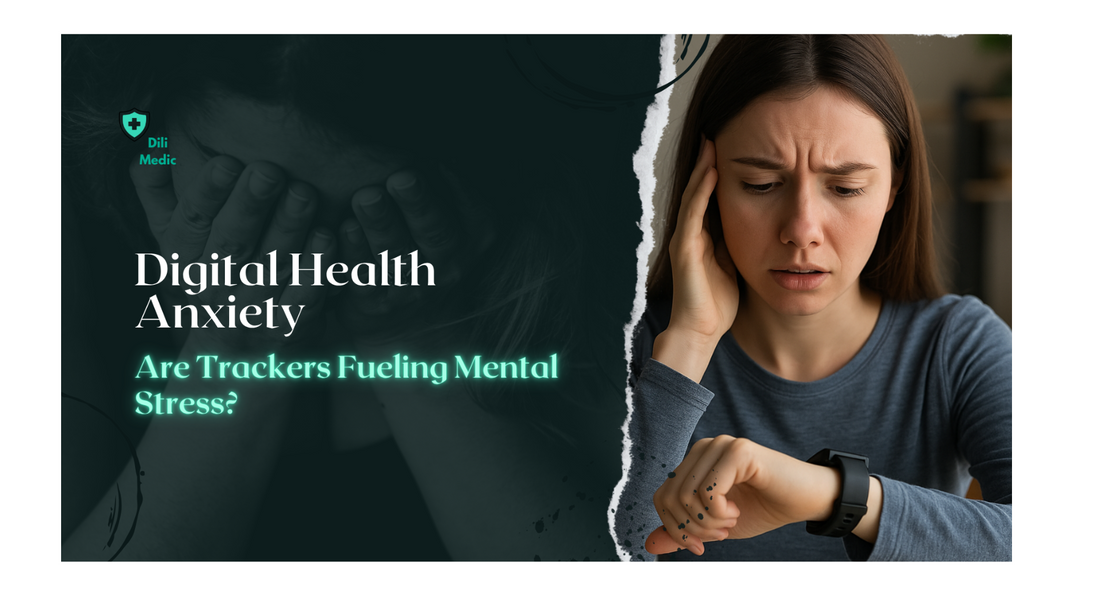
Digital Health Anxiety: Are Trackers Fueling Mental Stress?
Share
Health trackers are designed to help individuals monitor their well-being, but they can also contribute to rising levels of digital health anxiety. This form of anxiety occurs when users become overly focused on tracking health data, leading to obsessive behaviors, emotional stress, and misinterpretation of personal metrics.
This blog explores the psychological impact of continuous health monitoring, highlights the risks of relying too heavily on wearable data, and offers practical strategies for using these devices in a balanced and mindful way to support overall wellness.

The growing popularity of wearable health technology has brought self-monitoring into daily life. Smartwatches, rings, and mobile health applications now enable individuals to constantly monitor their physical health. While this innovation offers potential benefits, many users are also beginning to experience a new kind of emotional burden.
Digital health anxiety is becoming a real concern. This blog examines how the constant stream of health data can trigger stress, confusion, and obsessive behavior.
The Rise of Wearable Wellness
Wearable devices and health tracking apps have become a part of everyday routines. They provide continuous feedback on sleep patterns, activity levels, heart rate, hydration, recovery scores, and glucose variations. This technology is often promoted as an essential tool for improving one’s lifestyle. Many people begin using them to take control of their well-being and adopt healthier habits. The goal is often to be more informed and proactive. Healthtrackers. zdnet
However, as these devices grow more advanced and are integrated into daily routines, they also increase the pressure to monitor, assess, and react to one’s health in real time.
Health Metrics Gone Wrong: Anxiety in the Age of Data
Digital health anxiety refers to emotional distress caused by constant engagement with health-related metrics. For some users, tracking tools create mental stress that did not exist before using these devices. Individuals may find themselves constantly checking their devices for updates, worried about numbers like heart rate variability, daily steps, or sleep cycles. [Insert image placeholder: person anxiously checking wearable device]
A notable example is the case of orthosomnia, which refers to sleep disturbances triggered by an obsession with achieving perfect sleep scores. People struggling with this condition often spend more time worrying about the quality of their sleep than actually resting. Even minor fluctuations in sleep stages can cause panic, leading to even poorer sleep in the long run.
The Danger of Misinterpreted Health Data
Wearables provide data that may appear precise but is often generalized. Most devices are not designed to diagnose or treat medical conditions. They generate information that can vary based on environmental conditions, skin tone, device placement, or software settings. Without clinical interpretation, these metrics can be misread.
For example, glucose monitoring apps might suggest irregularities that cause concern in individuals without any known metabolic disorder. Similarly, spikes in heart rate caused by caffeine or stress may lead to unnecessary worry. When users act on this data without guidance, they risk making unhelpful or even harmful changes to their habits. Medical opinion on wearable accuracy.
The Burnout of Optimization Culture
Many users set daily goals within their tracking apps. These goals are often based on generalized standards rather than personalized health plans. Missing a daily target can lead to feelings of guilt or self-criticism. Over time, this performance-based mindset contributes to wellness fatigue. People may begin to view self-care as another item on a productivity checklist.
This mental burnout affects not only emotional health but also the user’s relationship with their body. Instead of feeling connected to physical signals, individuals become disconnected from natural intuition, relying solely on external data for validation.
Wellness Rebellion: Saying No to Tracking

A growing number of individuals are choosing to step away from tracking altogether. Influencers and professionals in the health tech space have begun advocating for digital detoxes and mindful living practices. This shift encourages people to check in with how they feel physically and emotionally, without constantly referencing numbers.
Some people now prefer using journals, guided breathing practices, or simplified routines to support their health. These strategies focus on grounding, routine, and present-moment awareness rather than digital metrics.
Balancing Data with Intuition
Wearable devices can still be useful if integrated with mindfulness. Instead of using them as a constant evaluator, users can treat them as occasional tools. Here are several suggestions for those who want to reduce anxiety while still benefiting from technology:
- Turn off constant notifications to avoid stress triggers.
- Check data only once per day or less.
- Focus on weekly or monthly patterns instead of daily numbers.
- Avoid tracking during times of illness or high stress when readings may fluctuate.
- Speak with a healthcare provider before making changes based on device output.

Seeking help from mental health or medical professionals can also bring clarity. Clinicians trained in behavioral therapy can offer specific strategies to address obsessive tendencies related to health tracking. Mental health resources and guides.
Key Takeaways:
| Health trackers can support personal wellness, but overuse may contribute to digital health anxiety. |
| Obsessive monitoring of sleep, activity, and heart rate can trigger emotional stress and self-doubt. |
| Health metrics should be interpreted with context and not viewed as absolute truths. |
| Wellness practices should also include mental rest and periods of disconnection. |
| Combining technology with mindfulness allows individuals to build healthier and more intuitive lifestyles. |
Frequently Asked Questions
-
What is digital health anxiety?
Digital health anxiety is a psychological response to frequent monitoring of health metrics through wearable devices. It can include stress, worry, or compulsive behavior. -
Can sleep trackers disrupt actual sleep?
Yes. Obsessively checking sleep scores and trying to control sleep quality can lead to anxiety, a condition sometimes referred to as orthosomnia. -
Are health metrics from trackers accurate?
Many devices provide general estimates. They are not substitutes for professional medical tools or diagnostics. -
What is the best way to use a wearable device mindfully?
Limit usage, reduce notification frequency, focus on long-term trends, and seek guidance before making health-related decisions based on device data.

1 comment
Great blog post on digital anxiety